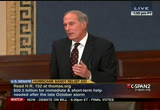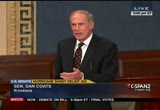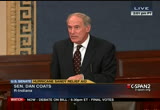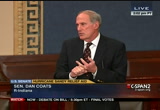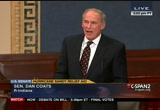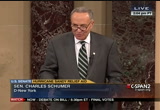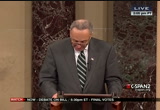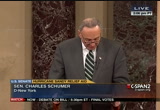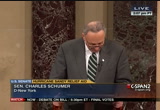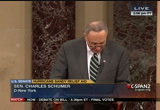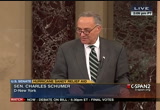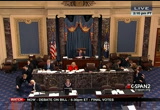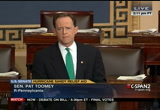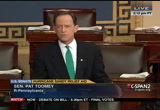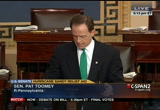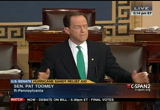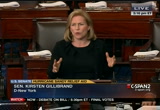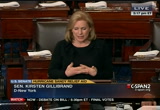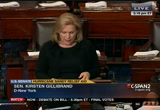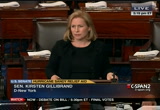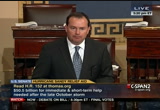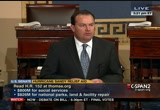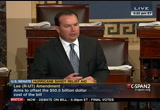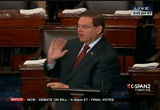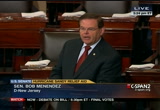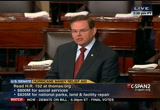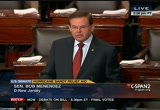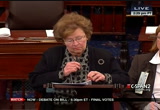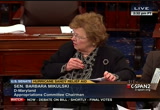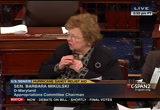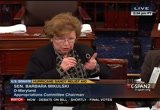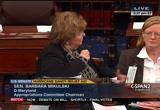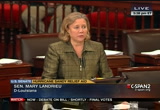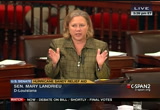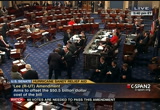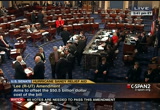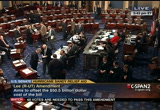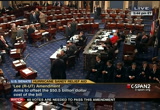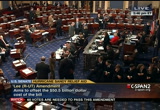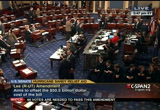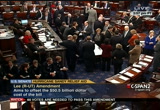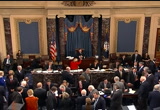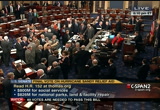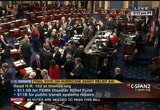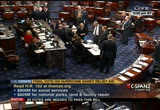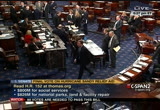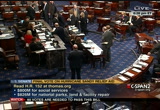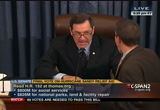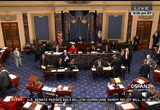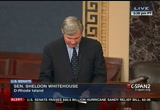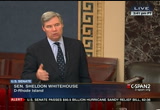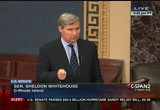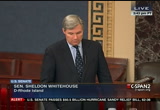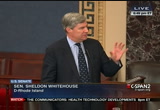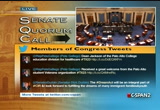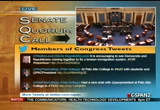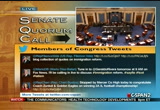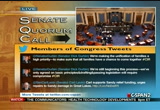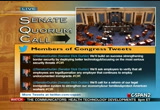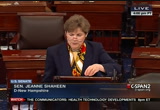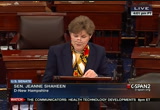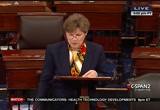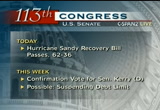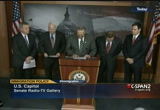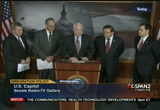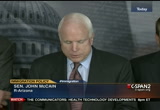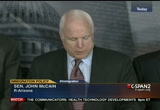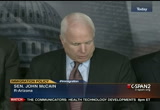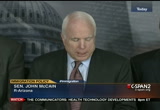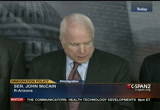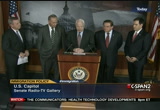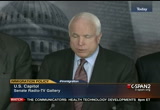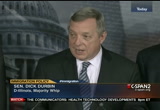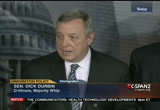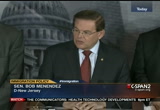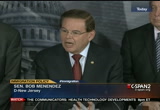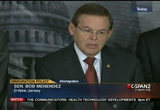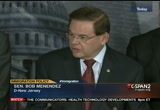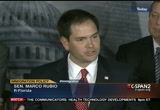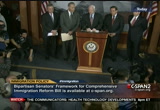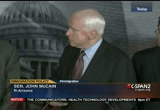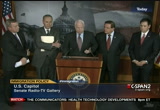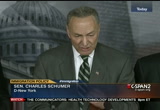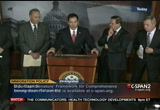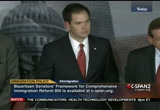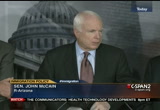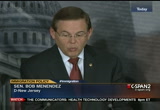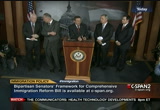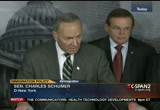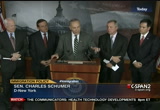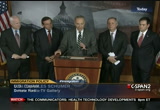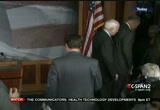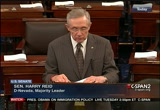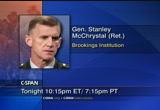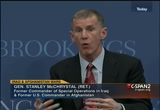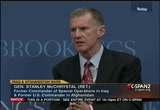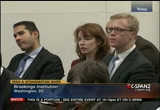tv U.S. Senate CSPAN January 28, 2013 5:00pm-8:00pm EST
5:00 pm
ensure that we don't make those mistakes in the future. it's also i think worthwhile to at least examine the possibility of paying for expenditures, particularly when you're borrowing 40 cents of every dollar when you are careening into a debt and deficit which the younger generations are not going to be able to pay off without serious adverse consequences. you know, i think the latest figure was that for $1 spent on the younger generations, my generation gets $4 from the federal government. well, there's a moral issue here about what kind of country we're leaving for the future and what we're turning over to our children. and so i think it's worthwhile to at least acknowledge that those of us who raise these kind of questions not be labeled or targeted as trying to throw people on the street or not
5:01 pm
respond to legitimate needs, but we're simply trying to say we need some standards here to apply to a situation where our spending is out of control. now every business in america has to do this and has had to do this this past four or five years in order to survive. families have had to do this in order to make sure they can make the mortgage payment, or dad has lost his job. there's been enforced discipline on the basis of an economy that has been stagnant for about four years. in the meantime the federal government keeps plunging into debt. so if someone brings forward an alternative to at least give us the opportunity to provide effective oversight and to make sure that this money does go to emergency needs and doesn't just fulfill a wish list for what some cities would like to do in the future to prevent against future storms -- not that we shouldn't be debating that, but that doesn't qualify as an
5:02 pm
emergency need getting money to the people that need it now. these are future decisions. we haven't had time to assess those. we haven't had time to examine those in detail. we haven't used the process that is in place here in the united states senate to go through committees and let the committees work through, is this essential to meeting the emergency needs? or can we set this aside and spend a little more time examining it, looking at it to make sure that this is how we want to go forward? we have a habit here of throwing money at things under an emergency category and then later finding out that, one, it wasn't an emergency where the money went. and, number two, it was misspent and not effective. we simply can't afford to keep doing this. once again i want to state we're not here trying to undermine
5:03 pm
funding for sandy, needed for sandy. some of the things the house did i think are legitimate in terms of saying let's set aside unrelated matters. it doesn't mean we cast them into the dust bin never to be seen again. it simply means let's let those that are not emergency situations be more carefully examined in terms of whether we need that. and if someone does come to the floor, as senator lee is going to do, is my understanding, and offers a potential offset, let's at least look at that possibility. the debt clock is ticking and ticking ever faster. and it is destroying the hopes and dreams of future generations. and i think we have a moral responsibility to at least be as conscious and effective with dealing with the taxpayers' dollars in terms of how they're spent, whether it's an emergency supplemental related to a disaster or whether it's just a normal appropriation that comes along every year through our
5:04 pm
appropriations process. we haven't exercised that kind of discipline, and our country is going to pay a very serious -- series of consequences as a result of that. and most importantly, we're denying young people in this country a future that we have enjoyed but we're not going to be able to pass on to others. with that, mr. president, i yield the floor. ms. mikulski: mr. president, i yield five minutes to senator schumer. the presiding officer: the senator from new york. mr. schumer: thank you. first i want to thank the chair of the appropriations committee for the wonderful job she has done. we've worked as a team together, and she's been great. this is her first major bill, i guess, she's handling as chair of appropriations, and i think it bodes well for the future of, if you will, the strengthening of that committee on into the year as we do appropriations bills. i want to thank my colleague from alabama, my gym mate, senator shelby, for his help and
5:05 pm
support. and i think he and senator mikulski will be a great team as chair and ranking on appropriations. i want to thank mary landrieu and the other subcommittee chairs. they did an amazing job for us, and i thank them. mary's assistance, advice, given what she went through several years ago in louisiana with katrina, was invaluable to those of us in new york and new jersey. and finally, my colleagues, i see senator gillibrand is here. senator blumenthal is in the chair. in addition, senators murphy, senator menendez, senator lautenberg, we've all worked as a team, and i thank them for their efforts. now, mr. president, it's been 91 days since sandy struck. it's taken far too long, but we are finally one vote away from getting much-needed aid that we so desperately depend on in new york and new jersey.
5:06 pm
it was three months ago that super storm sandy tore up the east coast, obliterated hundreds of thousands of homes in new york. it was 91 days ago this hurricane coupled with a cold front and uprooted the small businesses that are the lifeblood of middle-class communities in long island, staten island, queens, brooklyn and lower manhattan. as you may recall, sandy's wrath was wide, it was deep. nearly 300,000 families had their homes damaged or destroyed due to sandy. 131 people were killed, 60 in new york. two million individuals lost power, and our nation's public transportation system witnessed catastrophic flooding. now despite overwhelming damage from wind and water, snow and in some neighborhoods even fire, new yorkers are ready to move forward. not one day has passed since sandy made landfall that i haven't heard from my
5:07 pm
constituents wondering when washington will remember them. i heard the words from my good friend from indiana. i know he's a caring person. for decades taxpayers in new york have sent their money when disasters occurred with fires on the west coast or floods in the missouri and mississippi valleys. hurricanes in louisiana or florida. and other disasters. we've sent our tax dollars, billions of them. and now all of a sudden some are suggesting we should change the rules when we are hit by the first major disaster to hit the new york city region in a very long time. that's not fair. that's not right. and we have argued against it, and i hope my colleagues will defeat the lee amendment. and i also say to my colleagues that this is not just dollars and cents. these are people who care, are waiting, homeowners waiting to rebuild their homes.
5:08 pm
they haven't moved back in. small business owners who are hanging on by a thread after building a business for 25 years. we know when the hand of god strikes, it's overwhelming for them. take rita from emerald magic lawn care. her company helps local families, schools and businesses with lawn care in the spring and summer and around the holidays they help with decorations and lights. but emerald magic's business was interrupted for many weeks. the client base dried up. rita's business will be in huge trouble. it may not survive if she doesn't get a lifeline and get one now. so this is very important. week after week, month after month new yorkers have been told this is -- quote -- "a waiting game." that's not an answer we can live with, and neither can they. we can't wait any longer, because nothing about this disaster was a game for the
5:09 pm
families in breezy point or in rockaway or in long island or in queens or in staten island. no, it wasn't a game for them or the more than 265,000 small businesses whose doors are currently shuttered. 265,000 small businesses. or the hundreds of thousands of homeowners who have severe damage to their homes. many don't have their homes anymore. they can't wait either. and they are the not the only ones. our schools and hospitals are still combatting sandy-related repair. the damage to our roads and transit systems haven't gone away in three months. our coastline must be rebuilt so we're not naked if, god forbid, another sandy occurs. new york has waited, but we can't wait, mr. president, any longer. we know too well that when a disaster strikes, a major disaster, it's too much for any one state or any one region to
5:10 pm
tackle. but that's what we've been left to do so far in new york. and i know the same for my colleagues in new jersey. so senators lautenberg, menendez, gillibrand and i are making a plea to our colleagues. please, we've waited 91 long days. we can't wait any longer. simply put, we must pass this bill today. 91 days ago sandy struck a body blow against new york. today finally we can strike back and give our people the help they need to get back on their feet and rebuild our communities. mr. president, i yield the floor. the presiding officer: the senator from pennsylvania. a senator: thank you, mr. president. mr. toomey: i rise to continue this discussion about sandy. there isn't any doubt about the
5:11 pm
severity of this tragedy, about the human suffering. it is absolutely the case that the needed emergency money should have been there already. there's a real genuine need, and that need needs to be met. that's part of the reason i voted in favor of spending $24 billion which could legitimately described as the kind of emergency funding that suffering people needed. what i'm concerned about, mr. president, is i guess two things. one, the fact that some people have used the occasion of the misery that these people are suffering through to add all kinds of spending that has absolutely nothing to do with sandy. and none of it is offset. so, we've got a $1 trillion billion budget deficit -- $1.1 trillion to be precise -- and we're just adding another $60 billion right on top of that. the items that i would suggest certainly don't have much to do with sandy.
5:12 pm
$15 million for nasa repairs at the kennedy space center in florida. $274 million for the coast guard acquisitions in the bahamas and the great lakes. $2 million for the smithsonian repairs. there's another whole category of items which is tens of billions of dollars, which is long-term construction projects for the mitigation against future storms and disasters. now is that an important expenditure by the federal government? probably is. probably should be a high priority. but is it an emergency? of course not. it's infrastructure. it's going to be spent over years, maybe decades, as we build sea walls to protect beaches off the coast from future storms which are years away. now, is that an important consideration? i think it is. but when you're running trillion-dollar deficits, i think it has to compete with the
5:13 pm
other legitimate demands, for the long-term spending and infrastructure spending and the ways that we're going to protect our country, and so many other ways as well. but we have no such process here. and that's part of what's wrong here. that's part of what wrong with this town and why we are in such a mess is because this body and congress generally just refuses to make choices. so i can understand completely all of this money being spent if that's the determination that every one of these projects that have nothing to do with sandy still nevertheless need to be funded. but couldn't we offset that by trimming spending elsewhere so that we don't further accelerate this decline, we're heading towards a fiscal crisis? unfortunately, i guess not unless we adopt the lee amendment. what the lee amendment does is it says let's trim all discretionary spending by .5% over the next nine years.
5:14 pm
so can we find half a penny of every dollar that we would otherwise spend so that we would fully fund everything in this bill. not a dime would get cut from this bill, but we wouldn't add to our deficit and further accelerate this path we're on to a fiscal crisis. mr. president, we don't have to wait any longer. we can do this right now. we don't have to cut a dime from this bill. we can fully fund this bill. but at some point we need to start making choices around here. at some point we can't just have everything. that's how you get trillion-dollar deficits. that's how you end up like greece. so i would just suggest let's pass this bill. let's spend all the money in the sandy supplemental. but let's offset it with a cut of .5% in discretionary spending over the next nine years. that's what the lee amendment does, and i urge my colleagues to support it. and i yield the floor.
5:15 pm
the presiding officer: the senator from new york. ms. gillibrand: i would like to thank the leadership of senator mikulski for not only leading the charge in the aid that our families in new york so desperately need, but as chairwoman of the appropriations committee, making sure this bill is as strong as it possibly can be. i agree with her remarks about how the bill could have been better if they left in place what the senate had written. i want to thank you, madam chairwoman, for your dedication to helping our families and businesses recover. it's made such a difference. i also want to thank senator landrieu for her experience and expertise in meeting the needs of states devastated by natural disasters. she has had to live through these tragedies before. she knows what it's like to talk to constituents whose loved ones have been lost, whose families and businesses have been destroyed and torn apart and whose lives are just in the
5:16 pm
beginning of being rebuilt, so i want to thank her for all she has done. i also want to thank senator menendez who will be following me in remarks or senator lautenberg, and senator chuck schumer for the work he has done on behalf of new yorkers, really being the clarion call for commence and for immediate action and for bringing our colleagues together to meet the needs of so many families who are so much in need. i rise today to urge my colleagues from both sides of the aisle to support our effort to finally come to the relief of millions of americans who are suffering in the wake of superstorm sandy. new yorkers in my home state have had to wait far too long for congress to act. superstorm sandy was a weather event unlike anything we in new york have ever seen before. it claimed the lives of 60 new yorkers, left hundreds of thousands with significant damages to their homes and their businesses, their neighborhoods and their families.
5:17 pm
this body came together just before new year's to provide the desperately needed aid that families require to rebuild their homes and their businesses and their lives. the aid our small businesses so desperately needed to get their businesses up and running, the lifeblood of our communities flowing again and getting our families just back up on their feet. this bill should neither be controversial nor partisan. we have already debated and passed an almost identical package that was passed by the republican-led house of representatives. once again, the american people are watching us to see if we can come together and stand by families in need just as we've done for every natural disaster in our nation's history. they are watching once again to see if this body will do the right thing or just turn its
5:18 pm
back on them and not give them the support they need to be able to rebuild. this was always an emergency spending bill. it's an emergency. it's urgent. it needs our action now. we have to seize the opportunity without causing any further delay, and we have to show the american people that we can rise up on an occasion like this when duty calls to do the right thing. and i can assure you there is no one who was a -- wants to spend a single cent more than is actually necessary, which is why we took such pains and efforts to make sure this bill was transparent, had accountability, and the right kind of oversight. we are urging that we fully fund this proposal that was so carefully put together. since 1989, congress has passed 36 emergency appropriations for disaster relief with not
5:19 pm
specifically designating any offset. there's no reason why we should treat this disaster, this emergency, this horror any differently than we've treated past disasters. when disasters do strike, we have always found the goodwill and the care for one another to do the right thing. protecting people, looking after them, making sure they're safe, allowing businesses to grow, that is what we should be doing. our federal government's role is to protect the people first. it's our duty as public servants. so i'm urging my colleagues once again find that goodwill, help others, do the right thing. thank you, mr. president. the presiding officer: the senator from utah. mr. lee: mr. president, i i have
5:20 pm
an amendment at the desk and i ask for its immediate consideration. the presiding officer: the clerk will report the amendment. the clerk: the senator from utah, mr. lee, proposes amendment numbered 4, at the appropriate place -- mr. lee: mr. president, i ask unanimous consent the reading of the amendment be dispensed with. the presiding officer: without objection. mr. lee: mr. president, i stand today to urge my colleagues' support for my amendment to this bill. i appreciate the eloquent arguments made by my friend and colleague, the senator from new york, a moment ago. she is correct to point out that people have suffered as a result of this storm. my heart goes out to them. any time my fellow americans find themselves in a position of need, we want to address that situation very carefully and make sure we do the right thing, make sure that people are not overlooked. as we do that and especially as we do something like that, in the way in which we are being asked to do it here, we must also consider how our actions here might have other
5:21 pm
implications down the road. we have to stop and consider the fact that we are more than $16 trillion in debt and that we're adding to that debt at a rate of more than a trillion dollars every single year. the amount of money that we spend in interest on our national debt, which now stands at a little before $200 billion a year, is expected to grow significantly in the next few years such that by the end of this decade, at least, perhaps much sooner, we're likely to be paying close to a trillion dollars a year just to pay the interest on our national debt. it's because of considerations like these that we have put in place certain spending caps in connection with the budget control act in the summer of 2011. and it's for this same reason that i am asking that we consider capping, subjecting this same amount, this money that we're being asked to spend here to the same caps.
5:22 pm
in other words, what i am talking is that we find a way to offset our spending through this bill by stretching it out over the next nine years, capping what we spend. in other words, all we have to do to offset what we're being asked to spend here is to cut our discretionary spending by .5% over the next nine years. i think that as we look at our economic realities, we look at the fact that it's going to be very difficult in coming years for us to fund everything that we need to do through the federal government, this is the approach that we've got to take with regard to new spending. so when we're being asked to spend money, regardless of how important the cost, to the tune of more than $50 billion in one fell swoop, i think we owe it to the good people of the united states of america, the good people who depend on so many things that the federal government does, things as wide
5:23 pm
ranging as defense at one end of the spectrum and entitlements at the other end of the spectrum and everything in between. we owe it to them to consider how our actions today might forestall, might complicate, might impair our ability to fund those programs down the road. it's for this reason that i think we need to offset this spending, and we can do it by cutting only .5% of our discretionary spending over the next nine years. for that reason, i urge each of my colleagues to support this amendment. thank you, mr. president. i yield back the floor. a senator: mr. president? the presiding officer: the senator from new jersey. mr. menendez: mr. president, first of all, i want to thank the distinguished chairlady of the appropriations committee for all of her incredible work and help here, as well as that of the staff, in bringing us here to this moment. we wouldn't be here without her tremendous work, especially in light of chairman inouye's
5:24 pm
passing. and i appreciate the ranking member as someone who understands the challenges, having come from a gulf state that saw the consequences of disaster. and there are a couple of important dates here. the first one is 91 days, 91 days since superstorm sandy hit the northeast. 91 days since we have been languishing, waiting for our government to respond to the critical issues, life and death situations of fellow americans. 90 days in which people who largely lost their home or at least the ability to be back in their home have been waiting for their government to say here is how we're going to help you. 91 days in which we now have the biting cold of winter and the defenselessness of a coastline that cannot be subject to a
5:25 pm
nor'easter and ultimately have real-life consequences to people's lives, to people's property, to repetitive loss. 91 days compared to what happened during hurricane katrina where $60 billion was moved in 11. 91 days, 91 days in which people have not been able to get their lives back on track, looking to their government, people who are good citizens, pay their taxes, obey the rules, follow the law and ultimately say we have been left behind. it is enough, mr. president. another 118 days, that's all we have left to memorial day and the beginning of a critically important season for new jersey's economy. a $37 billion tourism industry
5:26 pm
that cannot get back on its feet unless the federal government says here is how we're going to help businesses reopen. here's how we're going to help people get back into their homes. here's how we're going to help you rebuild the infrastructure that is not only important to the state's economy but to the national economy for which new jersey and of course new york are such big drivers of this national economy, well over 10% to 11%. we only have 118 days, and we have been languishing. now, i personally am tired of listening to the voices of patients and delay and suggesting that somehow we as citizens of the united states are second-class citizens waiting for this government to respond to the needs of fellow americans. that is not what i envision when i think about the united states of america. another number, mr. president.
5:27 pm
36 times, 36 times in which we in fact have looked at an emergency in this nation squarely in the face and said it is an emergency. an emergency is an emergency is an emergency. for over two decades, the congress has looked at these set of disasters and said it's an emergency. but when it comes to the northeast, somehow it's not an emergency 91 days later. and offsets, well, we didn't have offsets for those over two decades, and -- and when we talk about these offsets, we use the word discretionary spending, i think americans should know what that means. it means education, it means health care, it means the national institutes of health, it means a whole -- it means law enforcement, it means a whole host of things that we care about in our lives everyday, across the board cuts,
5:28 pm
indiscriminate, without thinking about what the consequences are. only when it comes to the northeast. so i want my colleagues to understand that personally this senator will judge the future by how we are ultimately responded to. we already feel chagrined, but it is what it is. we need to act today. adoption of this amendment would not only create an across the board cut that has consequences to critical things americans broadly define on and does it indiscriminately, but also sets us further back because we would have to go back to the house again, and delays and more delays. well, i want look at the face of any american, whether in my state or anyplace in the country, and say you know, your government has abandoned you, you'll have to wait. i can't look at a business owner who is making a life decision about whether -- what little
5:29 pm
they have they can reinvest and whether they'll get any help from the government to open up, hire people and contribute to our economy. i can't look at the face of a fellow new jerseyan and say i still can't tell you what the government will do to get you back in your home. and i would suggest to any of my colleagues that you wouldn't want to look at the face of your citizens and have to be in the same position. the time has passed, and it is now time to pass this bill without amendment in an up or down vote in what i think will be the same bipartisan vote that we had when we originally sent the senate bill out. with that, mr. president, i yield the floor. the presiding officer: the senator from maryland. ms. mikulski: mr. president, we're just moments both from voting on the lee amendment and on final package. -- final passage. i want to rise to oppose the lee amendment, the junior senator from utah. his amendment would cut 63 -- excuse me, $6.3 billion from
5:30 pm
fiscal year 2013. that's $6 billion. that's in addition to the $3.4 billion we already have that's an offset in the bill that's charged against the corps of engineers. plus he wants to reduce spending by another $44 billion over an eight-year period by lowering the discretionary budget caps that were agreed to in the 2011 budget control act. overall, he pays for $50.5 billion in emergency aid with $51.2 billion in cuts. that's $700 million more in cuts than the disaster aid in this bill. i think that's going too far. i think when you cut more than you're going to spend, that is going too far. $.3 billion is an unspecified
5:31 pm
cut in the middle of fiscal year 2013. it would cut national defense. it will cut law enforcement. housing assistance, agricultural assistance, and, guess what? it even cuts -- the way it's written, it will even cut veterans' benefits. which are ordinarily viewed as mandatory spending. this $44.9 billion is a reduction to the caps set by the budget control act of 2011. the budget control act for my colleagues who don't seem to remember that we actually did pass a budget control act already says we in the appropriations committee will cut $1 trillion over the next nine years, so the cap is already on us on what we can spend. that's $100 billion a year.
5:32 pm
now, the lee amendment would even add more to that. now, you can't tell us to pass a budget the way they did in the house bill on the debt limit and then say, pass the budget. we did pass the budget control act, and now the lee amendment will shred that agreement. it'll just shred it. so why, while we're working to pass a budget, why then every time something comes up you're going to shred it. so i would like to follow what senator coats has talked about. let's get back to regular order. let's not be kind of doing cuts du jour, cuts on the floor, who can outdo who? senator coats has many good ideas in his presentation and as an appropriator gentleman on my committee, i look forward to working with him. if i could just finish my remarks, and i'll turn to the gentlelady from louisiana.
5:33 pm
and also this amendment is terrible in terms of process. if we pass the lee amendment, not only will it shred the budget control act of 2011 -- just shred it -- it will then send this bill, that meets compelling human need, back to the house. well, the house has already shrunk this bill. and it will further embroil us in process and very likely this bill may die due to some of the extreme elements in the house. now, the answer to me is obvious: let's defeat the lee amendment, let's pass this bill. people are suffering in new york, new jersey, maryland, connecticut, and let's do that. peopllet's acknowledge the valiy of the arguments that have been raised about how we look at disaster assistance, and i am more than open to it on our committee. and so i would hope that we
5:34 pm
could defeat the lee amendment, pass the urgent supplemental that is pending before us, even though it already has an additional $3.4 billion offset which is essentially a cut of fiscal 2013, $3.4 billion cutting the army corps of engineers, which by the way, only has $5 billion. like, if you're going to cut, learn math, and learn how to read the bills and the chart. math is good. i like math. i was -- and we're going to follow math. and with that, i'm really going to ask that we pass the bill. late not cut more than is in the bill -- let's not cut more than is in the bill. let's do the math and know that we're already cutting, and let's do the job that the american people want. this concludes my remarks, but before i do turn to the gentlelady from louisiana, there
5:35 pm
are two sunshine things that i want to saivmen say. first, i note on the floorks the return of senator -- first, i note on the floor, the return of nosenator mark kick. he is a member of the appropriations committee. we've worked together on many issues. we've disagreed, we've duked it out, we've had some good tiles and it's just a pleasure to see him back on the floor and ready to vote. and also i note that now joining as the ranking member of the appropriations committee, senator shelby of alabama, someone i've worked with over the year, and i think we can pledge, though we will differ on policy or matters, there will be more that we agree upon. but h you will see in this appropriations, an effort at bipartisanship, civility, intellectual rigger, robust trade and transparency. so we look forward to working together with each other and with our colleagues. with that, i yield to the
5:36 pm
gentlelady from louisiana. the presiding officer: the senator from louisiana. ms. landrieu: i thank the chair lady. is it not your opinion that if the lee amendment gets on this bill, it will in fact kill the sandy supplemental? isn't that your understanding of what will happen if the lee amendment is adopted? ms. mikulski: what was the question? ms. landrieu: i'm sorry. isn't it your understanding that if the lee amendment gets adopted, which i don't believe that it will, but if it did, is it your opinion that the bill will be either killed or in serious danger of passing? ms. mikulski: i think it will be in very serious danger of passing because even -- even the impact of the cuts are significant, severe, and even armageddon. but it would send it back to the house for further negotiation and the house is out this week, then they kind come back.
5:37 pm
i think that this bill very likely will die in a conference when it cannot -- the economies and the lives of the people in our state and quite frankly i say back to the gentlelady, as we're looking at frugal, i know the gentlelady has had a history of really looking at how to have a more frugal and sensible government. but, you know, we funded two wars on the on on a credit cards part of reason we're in this mess. and now we have plenty of money, plenty of money, to rebuild iraq. now we're debating, nickle-and-diming, over rebuilding new york and new jersey, parts of connecticut, little, poor rural parts of maryland. so, yeah, i think it will have a terrible effect. ms. landrieu: thank you. and can i ask, please, how much time is remaining and ask if i could have one minute?
5:38 pm
the presiding officer: no time is remaining on the democratic side. the republicans have five minutes remaining. ms. landrieu: could i ask unanimous consent for one of those? the presiding officer: without objection. ms. landrieu: i really thank my colleagues for this. let me say that it is my clear view and opinion that if the lee amendment is passed, the sandy supplemental will die. and the reason is because there is strong feeling led by this senator from louisiana to the senators that are arguing for that position that if we want to debate about how to pay for disaster, i will do that. we will do 50% of cuts and 50% of revenues. but they never will offer one penny of new revenues to pay for anything. and i am not budging on this point. so this amendment, if adopted, will kill this bill.
5:39 pm
now, i will go 50% revenue, $25 billion we'll raise, $25 billion we'll cut. but i am not going to keep cutting the discretionary budget, which, by the way, is not out of control, despite what you hear on fox news. it's mandatory spending that is rising rapidly because the greatest generation that gave us the greatest nation the world has ever heard is dying, and they need hospice care, they need social security and think need hospitals. if they witness to cut them, go right -- if they witness t wantt them, go right ahead. i'm going to be a little more gentle. and, number two, we can do this together if we want. this argument not a small argument for the chair of the homeland security appropriations committee and nor for our colleague. i yield the floor. the presiding officer: under the previous order, the question occurs on amendment number 4
5:40 pm
6:08 pm
6:09 pm
under the previous order requiring 60 votes for the adoption of this amendment, the amendment is not agreed to. the clerk will read the title of the bill forked third time. the clerk: h.r. 152, an act making supplemental appropriations for the fiscal year ending september 30, 2013, and so forth and for other purposes. the presiding officer: under the previous order, the question is on passage of h.r. 152. is there a sufficient second? there appears to be. there is. the clerk will call the roll. vote:
6:29 pm
the presiding officer: anyone wishing to vote or wishing to change their vote? if not, on this vote, the yeas are 62, the nays are 36. the 60-vote threshold having been achieved, the bill is passed. mr. schumer: mr. president? the presiding officer: the senator from new york. mr. schumer: i ask unanimous consent the senate proceed to a period of morning business with senators permitted to speak for up to ten minutes each. the presiding officer: without
6:30 pm
6:31 pm
ms. murkowski: mr. president? the presiding officer: the senator from alaska. ms. murkowski: thank you, mr. president. the bill that we just voted out of the senate was important, certainly important -- excuse me, mr. president. i request that proceedings under the quorum call be dispensed with. the presiding officer: without objection. ms. murkowski: thank you, mr. president. mr. president shall the bill that we just passed out of the senate, a bill to aid the victims of the superstorm sandy, was important. it is important that when we are faced with a disaster, whether it is a hurricane, whether it is an earthquake, whether it is a
6:32 pm
drought, whether it is a flood, that we step forward and find those ways that we can help citizens who have faced immeasurable loss. and the effort that has gone back and forth between the two bodies now and that will hopefully move forward is one that will certainly help to address the needs of those families that lost so much in superstorm sandy. but i think we all recognize that this was not the only disaster that this country faced last year. in my state of alaska, we faced a fish disaster. now, for those of you that are from states that do not rely on your fisheries as a source of income, a source of jobs, or really a source of daily
6:33 pm
sustenance, you might think fish disasters? well, that's not really much to talk about. that's not a true disaster. well, mr. president, in my state, when you have a fisheries that has declined to the extent that we have seen, the loss of the chinook salmon on the ucon n river, the upper cook inlet, this had a dramatic impact on our state's economy, a dramatic impact on the livelihoods of so many alaskans, whether they be commercial fishermen, sport fishermen, our subsistence-based fisheries, our fisheries communities, those businesses that are dependent on our salmon fisheries, these were all impacted this past year.
6:34 pm
mr. president, as i had gone around the state basically from about midsummer through to the end of the year, everywhere i went, whether i was in an urban center such as anchorage or homar ohomer, or out in the rurs of the state, up along the yukon, up along the kuskokwim, out in south west, people were talking about two things. they were talking about the cost of energy, because our energy costs remain the highest in the nation, but they were talking about fish. pretty basic stuff -- fuel and fish. food. and so when we had disaster this summer, it was -- it was an imperative around our state.
6:35 pm
we in september of this past year had an official declaration from the secretary of commerce -- actually, the acting secretary of commerce rebecca blank recognized this fish disaster, and this is a disaster that is statutorily authorized by sections 308 of the interjurisdictional fisheries act and section 312 of the magnuson-stevens fishery conservation and management act. these are designations that are statutorily authorized. these are not earmarks. they are -- they are not to be labeled as "pork" or something special for an area. these are disasters subject to a statutory authorization, a
6:36 pm
process that has been clearly, clearly laid out, authorized in law for fish failures that requires affirmative action from the secretary of commerce. the secretary has taken that action. congress then needs to do its part by funding for these disasters. now, i mentioned at the outset that some of my colleagues might not appreciate the importance of these fish disasters, but, again, these disasters are not less important than stays terse that we provide for other industries such as drought disaster -- or drought assistance for our families. and i think that the acting secretary, when she signed these fisheries designations, she recognized them for essentially what they are: fish droughts,
6:37 pm
fish droughts in our rivers and our oceans, and responded to the fisheries disasters not only in my state of alaska, but she also moved forward with disaster determinations for rhode island, for new york, for maine, massachusetts, new hampshire, connecticut, and mississippi. and that disaster declaration that the acting secretary advanced opens the door then for the financial assistance from the federal government. well, mr. president, you might notice that the -- that those funds were not included in this stays tear relief bill. that does not mean that i will back down from attempting, doing my best to make sure that the disaster that alaska faced with its fisheries and that so many of our other states faced with their fisheries, that these
6:38 pm
needs will not be addressed. we didn't advance it in this package. it's important that the sandy provision move forward and that's why i eventually cast my vote in support of it. but i know that many of my colleagues -- the senator from rhode island is with me tonight -- i know the senator from new hampshire is very concerned about it, the senator from maine is very concerned about it. i think it's fair to say that we will continue our efforts to ensure the disasters that our fishermen have faced will be addressed, as is statutorily provided in yo law. we will work to find that funding, to make sure that disasters, however they present themselves in this country -- whether it is storm, flood, drought, hurricane, earthquake -- that they are addressed. so, i commit to working with my
6:39 pm
colleagues to continue to find those sources of funding so we address those revenues. i note that my colleague from rhode island is here, and i know that he, too, wanted to address this important issue. mr. whitehouse: mr. president? the presiding officer: the senator from rhode island. mr. whitehouse: thank you, mr. president. i very much appreciate my friend, the senator from alaska's remarks. this is truly a bipartisan concern. there are senators on both sides who feel very aggrieved by what took place -- senators from alaska and maine on the two sides of the country and a great number of us. the sheet that rests on the front table during the votes to make sure that people coming in know what the measure is that we're looking at describes the last vote as passage of h.r. 152, the disaster relief appropriations act of 2013.
6:40 pm
not the sandy relief appropriations act of 2013 but the disaster relief are appropriations act. well, we've had disaster. we didn't make this up. this wang something that got -- this wasn't something that got snuck into the bill or that we tried to do an army on. the -- an earmark on. the governors of rhode island, of mas massachusetts, of maine,f new hampshire, of new york, o sx governors petitioned for disaster declaration. they got one. the secretary of commerce declared the new england mult ispecies ground fish fishery disaster. the senator from alaska described it as a drought. it is like a drought. what's happened in our waters is that the waters have warmed, they have a had some chemical changes. fisheries have moved northward and some of them have moved
6:41 pm
clean out of the u.s. continental waters. the result is tha that yellow tl flounder, gulf of maine cod and lad dock have all had to face draconian catch reductions to try to keep those species alive. we have a fishing tradition that goes back even longer than alaska's i'll guess. certainly we started fishing back in the 17th century in rhode island. it is a long tradition. but the changes that we're wreaking on this planet are moving the fish around, and they are creating these localized disasters where our fishermen, who've worked hard all their lives, invested their live's savings into expensive boats that he have to take indicator maintenance and repair of, and they risk their health and lives and their limbs out at sea in
6:42 pm
all kinds of weather in order to bring the catch in to us. and when the catch isn't there, it is a disaster. that's what the governors asked for, all six of them. that's what the united states government, through the secretary osecretary of commerc. so why on earth -- the fishery disaster that affects our fish hemen, doesn't matter was $150 million. it was not a big piece in a $60 billion bill. and yet we got left out. we got completely left out. and i will continue to fight to get this dong. i think -- and i will continue to fight to get this to be. i think there's been a wrong committed in this body. i will work hard with the senator from alaska. i see the senator from new
6:43 pm
hampshire is on the floor. it makes no sense to let people in the house of representatives pick and choose among disasters in a bill and strip out disasters that have been declared by the united states government and the governors of six states. do they know better? i don't think so. but they took it out, and for whatever reason, we weren't able to get it in back here. i've had strong conversations with some of the supporters of the -- lead supporters of the sandy bill from the states that most benefit, with the chairman of the committee, and the floor manager of the bill, and with colleagues from nearby states. so this is not over. but i am extremely upset that we would pass something called a disaster relief appropriations act and leave out of it the disaster that has befallen fisheries up and down the east
6:44 pm
coast from maine down through new hampshire, through massachusetts, through rhode island, through connecticut, through new york. that's a pretty wide-scale disaster. for the men and women who go out and put their boats and put themselves at risk for this catch when it is not there, you boat it's a disaster. it's just as much of disaster as a farmer who looks out at parched fields and can't grow what they need to groavment but we're not there for them, not when it's fish hemen. we've done it before, over and over again. since 1994, federal fishery failures have been declared on 29 different occasion. and nearl nearly $827 million hn ahe want proked for relief, but not now. for some reason, not noi now. so i will a yield now to the senator from new hampshire. irknow they feel strongly about
6:45 pm
this. the senator from massachusetts, who was speaking with me earlier, she feels very strongly about thisment and we need to get this set right. this is a day for celebration in some quarters, but not in all. and for those of us who have a responsibility to the men and women who fish the seas off of our states, this is not an acceptable result. i yield the floor. nor senator mr. president? the presiding officer: the senator from new hampshire. mrs. shaheen: i'm here to join my colleagues from alaska and senator whitehouse to express my disappoint and frustration with them that the disaster relief funding has been stripped from this emergency relief bill. now, i agree with all of those who wanted to make sure that the victims of hurricane sandy along the east coast got the help they
6:46 pm
need. i think that's something we all are committed to. but the fact is, fishermen in new england and alaska and other parts of this country are also facing hard times. they're grappling with onerous regulations that are designed to end overfishing. and in spite of these restrictions, the amount of codfish in the gulf of maine has declined drastically. it has a huge impact on new hampshire. and the problem for fishermen in my state is now one of survival. they have already seen their incomes decrease significantly in recent years. they depend on cod more than fishermen from any other state in new england and cod accounts for more than 90% of the revenues of the fishing industry in new hampshire. this is because our fishermen use small day boats, they fish close to shore. most don't have the boats or equipment to catch other deep sea species to compensate for the lack of cod. our fishing businesses are sma small. they're mostly owned by families
6:47 pm
who've been fishing for generations. and for 400 years we've been fishing in new hampshire. generations of fishermen in new hampshire have continued this proud tradition. and yet under what's happening with the fishing regulations, we're going to lose this industry. our coastline is short in new hampshire. it's only 18 miles. but it's still a crucial driver of the economy, the fishing industry. it generates $106 million in economic activity. it supports 5,000 full- and part-time jobs in the state. and it provides our stores, our restaurants with a local and fresh supply of fish, just as it does in alaska and rhode island. but this historic way of life is going to become extinct if we don't help the fishing industry. now, i welcome the secretary of commerce's decision back in
6:48 pm
september to declare a federal disaster for the northeast fishing industry for the upcoming fishing year, but this declaration, as well as those already provided for alaska, mississippi, new jersey, new york, rhode island and other states, are meaningless if congress does not provide relief funding to these fishing communities. and as my colleagues have said so eloquently, the senate voted to appropriate $150 million in funding for these disasters last month. as senator whitehouse said, it was not a large percentage of the emergency relief bill, and i'm disappointed and like the fishermen and women in new hampshire who depend on this industry, frustrated that this funding has been taken out of the bill that we voted on today. it's critical that we provide relief to the fishermen and to the coastal economies in new
6:49 pm
england, in new hampshire, part of the new england economies in mississippi and new jersey and new york and alaska and the other states that are affected. we've got to work to ensure the long-term sustainability of these vital resources and of this historic way of life. and i intend to continue to work with my colleagues from those states that are affected to make sure the fishing industry gets the help it needs to survive. so thank you, mr. president. i yield the floor. mr. whitehouse: mr. president? the presiding officer: the senator from rhode island. mr. whitehouse: if the -- i heard the calculation of the distinguished senator from new hampshire that it was a pretty small percentage of the bill and i was going through the math in my head. if it's a $60 billion bill and $150 million appropriation that would have supported the disaster for the fishermen, i think that's 0.25% of the total
6:50 pm
of the bill, a quarter of 1%. and yet somebody over on the house side had to target that and take it out? and leave the fishermen high and dry while the rest all went through? i think it's really important that we, as a group, stand up for the fishermen and try to force some recognition in this body that their disaster they're facing is a real one. a senator: will the senator yield? mr. whitehouse: yeah. mr. shaheen: it's not just the -- mrs. shaheen: it's not just the people who are fishing directly who are affected by this. it's also all of the other jobs that depend on that fishing industry that are going to be lost. mr. whitehouse: the engine repair people, the net repair people, the people who process the fish that are caught, the folks who sell fuel to the fishermen, the people who do maintenance on the boats. there's an entire economic ecosystem that is knocked down when the fishermen can't bring
6:51 pm
the catch home,ier, the senator is absolutely -- home, yes, the senator is absolutely correct. mrs. shaheen: and in my state where we only have 18 miles of coastline, we have 5,000 jobs that are dependent on this industry. so in rhode island and alaska, i'm sure that you all have a significant number of jobs dependent on the fishing industry. and what happens to those jobs if the industry doesn't survive? they're gone. mr. whitehouse: i think alaska may actually have more coastline than rhode island does. ms. murkowski: i think we've got about 33,000 miles of coastline, not to be -- not to be bragging on the coastline. but what s is so important as pt of this discussion -- and you have stated this, senator shaheen -- that our fishermen often are not included when we think about areas of disasters, and yet in terms of those industries, those -- those parts of our economy that are making
6:52 pm
things happen, just folks kind of chugging along, it's our fisheries that -- that have for decades and for centuries, as you note, senator whitehouse, for centuries these have been producing good jobs and providing -- providing a source of sustenance for our families. alaska's in somewhat of a unique situation in that we still have so many families that rely on their fisheries for subsistence. this is not just an income source are for many but for -- for so many out in rural alaska, this means whether or not you're going to be able to eat this winter. and the situation on the yukon and the kuskokwim, when those rivers were shut down to fishing, we had situations where they came to the river and said, we have to put our nets in
6:53 pm
because we have to be able to feed our families. down in the cook inlet region, not so much a subsistence lifestyle there but this is a commercial fishery as well as sport fishing, so you have sport guides that are required to be off the river. you cannot -- you cannot take that -- that tourist who's -- who's come to alaska for their dream fishing trip, you cancel that, you lose your revenue. your guides can no longer stay in place. so, senator shaheen, you note kind of the ripple effect to the economy. it -- it is -- it is in all of our fishing communities and those who support them. so when we talk about disasters in an area and the $150 million that was to be split between all of these different regions and states, it's a recognition that it is -- it is quite slight in
6:54 pm
comparison to the true loss to our economies, the true there is to our families who have suffered this. so, again, i appreciate the commitment that we have from so many that have been impacted that we don't give up on this, that we have gone through the process, we've jumped the hurdles to get the designation that is required by our government through the secretary of commerce, we have done that. now the step is for congress to provide that -- that authorization, that funding that makes the difference. it's one thing to get a disaster declaration on paper. it's another thing to be able to provide the relief. and i certainly intend to push until that relief is provided not only for the families in alaska but for those who have been impacted by fisheries disasters throughout the country.
6:55 pm
6:59 pm
7:00 pm
the presiding officer: the clerk will report. the clerk: s. res. 9, designating january, 2013, as national mentoring month. mrs. shaheen: i ask unanimous consent the resolution be agreed to. the presiding officer: is there objection to proceeding to the measure? if not, the committee is discharged. the senate will proceed. mrs. shaheen: i ask unanimous consent the resolution be agreed to, the preamble be agreed to, the motion to reconsider be laid upon the table with no intervening action or debate. the presiding officer: without objection. mrs. shaheen: i ask unanimous consent that the senate now proceed to the consideration of senate resolution 19 which was submitted earlier today. the presiding officer: the clerk will report. the clerk: s. res. 19, congratulating the university of alabama crimson tide for winning the 2012 bowl championship
7:01 pm
series national championship. the presiding officer: is there objection to proceeding to the measure? without objection. mrs. shaheen: i ask unanimous consent the resolution be agreed to, the preamble be agreed to, and the motion to reconsider be laid upon the table. the presiding officer: without objection. mrs. shaheen: i understand that there is a bill at the desk, and i ask for its first reading. the presiding officer: the clerk will read the title of the bill for the first time. the clerk: s. 164, a bill to prohibit the united states from providing financial assistance to pakistan until dr. shakil alfridi is freed. mrs. shaheen: ski for a second reading and in order to place the bill on the calendar under the provisions of rule 14, i object to my own request. the presiding officer: objection having been heard, it will receive its second reading on the next legislative day.
7:02 pm
mrs. shaheen: i ask unanimous consent that when the senate completes its business today, it adjourn until 10:00 a.m. on tuesday, january 29, 2013, that following the prayer and pledge, the morning business be deemed expired, the journal of proceedings be approved to date and the time for their two leaders be reserved for their use later in the day, and the senate proceed to a period of morning business until 12:30 p.m., with senators permitted to speak therein for up to ten minutes each, with the majority controlling the first 30 minutes and the republicans controlling the second 30 minutes. finally, that the senate recess from 12:30 p.m. until 2:15 p.m. to allow for the weekly caucus meetings. the presiding officer: without objection, so ordered. mrs. shaheen: we anticipate the foreign relations committee will report out senator kerry's nomination and look forward to full senate consideration tomorrow. if there is no further business to come before the senate, i ask that it adjourn under the previous order. the presiding officer: the senate stands adjourned until
7:04 pm
7:05 pm
it sends information to a wearable patch that you wear on your torso that collects information of your physiology things like your heart rate and respiration body angle and activity. what we call a panel of 50 -- physiologic wellness and communicates with a cell phone processes it and sent it back as an application that can help you manage her own health. ca think we are early in the reflection point. malcolm gault -- malcolm gladwell calls a tipping point. we have had all these amazing changes and now we are poised to really make some great leaps in these complex diseases. our understanding of cancer has in the last five years have dwarfed the last one of five years in a next 10 years we will take it to amazing advances.
7:06 pm
>> last year jim lehrer martha ravitch and bob schieffer was liked by the commission on presidential debates. to moderate the prepresidential and one vice presidential debate. tonight they will share their experiences and what impact the debates had on the 2012 election it's held at george washington university and the opal media institute. it starts live at 8:00 p.m. eastern on c-span.
7:07 pm
earlier today a group of eight bipartisan senators held a news conference to release their own blueprint for the new immigration bill. plan includes four changes to immigration laws and we will hear more about it starting with remarks from new york senator charles schumer. this is 45 minutes. >> the five of us here today and eight of us in total including senators mccain durbin graham menendez rubio flake and bennett have come together on a set of bipartisan principles for comprehensive immigration reform legislation that we hope can pass the senate in overwhelming and bipartisan fashion. we still have a long way to go. but this bipartisan group -- sorry. we still have a long way to go but this bipartisan blueprint is a major breakthrough. it's our hope that these principles can be turned into legislation by march and have a
7:08 pm
market by chairman leahy's committee with the goal of passage out of the senate by late spring or summer. senator durbin and i spoke to the president yesterday to update him on this group's progress and he couldn't be more pleased. he strongly supports this effort. the key to our compromise is to recognize that americans overwhelmingly oppose illegal immigration and support legal immigration. to this and our framework contains for basic pillars. first, we created tough but fair path to citizenship for illegal immigrants currently living in the united states. that is contingent on securing our borders. second, we reform our legal immigration system to better recognize the importance of characteristics that will help build the american economy and strengthen american families. third, we create an effective
7:09 pm
employment verification system that will prevent identity theft and in and the hiring of future unauthorized workers and lastly, we established an improved process for admitting future workers to serve our nation's workforce needs while simultaneously protecting all workers. other bipartisan groups of senators have stood in the same spot before, trumpeting similar proposals but we believe this will be the year congress finally gets it done. the politics on this issue have been turned upside down. for the first time ever, there is more political risk and opposing immigration reform than in supporting it. we believe we have a window of opportunity to act, but we will only succeed if the effort is bipartisan. by their presence today, my republican colleagues are making a significant statement about the need to fix our broken
7:10 pm
immigration system. we democrats are equally serious. we do not want immigration as a wedge issue. much rather, we want a bipartisan bill that solves the problems and becomes law. we recognize that in order to pass bipartisan legislation none of us can get everything we want. that is why our framework says we can address the people living here illegally while at the same time securing our borders and creating an immigration enforcement system that ensures we will not again confront another 11 million people coming here illegally. on day one of our bill, the people here without status who are not criminals or security risks will be able to live and work here legally. that will make it easier for them to learn english and integrate into their communities without fear of deportation. but to prove to the american people that we are seriously -- that we are serious about
7:11 pm
permanently ending illegal immigration to the u.s. we say we will never put these individuals on a path to citizenship until we have fully secured our borders and combat at the pattern of people overstaying their legal immigration visas. we are asking our colleagues in the senate and the house to join us in this difficult work. it's time to work together to pass legislation that improves our security, grows our economy and ensures that we will continue to be a nation that lives up to the values of our founders. i'm going to turn it over to senator mccain in a minute. i want to say he has been the glue in our group. his wisdom, his strength, his courage, his dead fastness and many other adjectives that i will get to in a moment, have really been inspiring to me and i think to all of this. and i want to just say -- do you want me to go on? [laughter] and i want to say that every
7:12 pm
member of our group, including senator graham who couldn't be here today. senator mccain is a statement from him. have really been terrific in terms of understanding that we have to come to an agreement. we have to meet in the middle. the mission of getting a bill done to strengthen america is more important than any of us clinging to his best with the belief. and so i am optimistic. i am truly optimistic, more than i was when we had our first meeting in december that we can get this done. and i really want to thank every one of the members here. it's been so far -- we are only part of of the way done and there are loads of pitfalls but it's been a great experience so far and i think one that gives all six of us a great deal of optimism. senator mccain. >> i would like to thank senator schumer for his leadership. i would like to thank the democratic leader, durbin. there has not been anyone in america who has fought harder for the so-called dreamers then
7:13 pm
dick durbin house and he will continue to have the gratitude of many americans. my friend senator rubio who obviously is a new but incredibly important voice in this whole issue of immigration reform. senator menendez has also played a key role and of course senator graham, who is uncharacteristically absent from this gathering. as senator schumer mentioned it's a first step in what will continue to be difficult but achievable. i don't think i have to remind anyone the last major attempt was over six years ago. now we will again attempt to commit the remaining resources needed to secure the border, daughter nice and streamline our current immigration system and create a tough pair path to citizenship for those here illegally. and i would like to testify
7:14 pm
again the security situation along the southwest border is not perfect. there remain several areas, particularly in arizona where people's homes are being invaded. where drug smugglers are crossing property every night and the citizens deserve the same level of security that all of us the ending here have, but there is no question there has been a significant reduction in illegal crossings over the past five years. apprehension of illegal immigrants by the border patrol have dropped 70% from 2005 to 2012. but our work is not yet complete. we need to focus on drug arizona continues to be a major traffickers, criminals across smuggling corridor and distribution hub for drug trafficking organizations. to combat this, we need to continue to invest in high technology, uavs, radar and other proven surveillance
7:15 pm
systems that will give the border patrol the ability to detect and apprehend illegal entries into the united states. it's achievable and can be completed within the next three years if we commit to it. the next most important step is to ensure we don't repeat the mistakes of 1986, where we gave amnesty to 3 million people, promising the border would be secure and now of course we are dealing with 11 million people here illegally. so that has to have an increase in fines on employers that knowingly hire illegal workers. we have to have employment verification system that will end the hiring of future unauthorized immigrants. we need to shut off the magnet that attracts illegal workers. we will put in place a legal work are going to provide a humane and effective system that allows the immigrant workers to
7:16 pm
enter the country without seeking the aid of human traffickers, drug cartels, and any information that passes congress must establish practical legal channels for workers to enter the united states whether they are high-skilled, low-skilled or agriculture workers so we can free up federal officials to focus on those individuals truly intending to do our nation harm through drug smuggling, people trafficking and possibly terrorism. providing expedited path to citizenship for dreamers, developing a measurement to determine whether border is truly secure, reforming our future immigration system to better meet the needs of our employers, insuring an entry exit system to combat these overstays and create a program that makes certain u.s. agriculture has the necessary workers to maintain america's food supply are some of the issues that we have committed to
7:17 pm
addressing and solving in a bipartisan manner. finally, we come to the most controversial piece of immigration reform and that is how to deal with the approximately 11 million people living in the united states outside of legal status. what is going on now is unacceptable. reality that has been created as a de facto amnesty. we have been to contend for too long to allow individuals to mow our lawns, serve our food, clean our homes and even watch our children while not affording them any of the benefits that make our country so great. i think everyone agrees that it's not beneficial for our country to have these people here hidden in the shadows. assistant to the system to bring them forward and allow them to settle their debt to society and fulfill the necessary requirements to become law-abiding citizens of this country. this is consistent with our country's tradition of being a nation of laws and a nation of
7:18 pm
immigrants. i would like to read senator lindsey graham's brief statement. he says, hope the third time is a charm. i've enjoyed working with my senate colleagues in drafting these principles and believe we are off to a good start. the bipartisan immigration principles represent a real breakthrough on substance and i hope they will be seen as a breakthrough reforming our political coalition to finally solve our immigration problems. the coalition must also include the president and the house of representatives. my hope is immigration reform bill will start in incentive and we seem an overwhelmingly bipartisan though. we are long way from having legislative blanche but i do believe 2013 represents the best chance to pass immigration reform in many years. time is right and the way forward while difficult, is being better defined by the day and with a reasonable amount of political give-and-take we will
7:19 pm
be successful. however for some reason we feel in our efforts to pass comprehensive immigration reform, i do believe it will be many years before anyone is willing to try to solve this problem. we should start this new attempt hopefully with full understanding of how difficult it is. let me finally say again, in the last couple of days we have been able to invent what was called the nuclear option in in the united states in it. a lot of people don't appreciate how important it was for us to get that done. check schumer and i and others and durbin were involved in a bipartisan effort to avert that. thanks to the cooperation of our leaders, we were able to do that. there is a desire for bipartisanship here in this body. i think we can show the country in the world that we are capable of tackling this issue, a looming and terrible issue that has to be resolved in a bipartisan basis. and i believe the majority of the american people support such
7:20 pm
an effort and i want to thank my colleagues again and the african junior of senator schumer. >> and now we will have even more congeniality with senator durbin. >> i want to thank my colleagues. john mccain, thanks. i feel very good about the chance of this. chuck, thank you for your leadership on this and bob and lindsey and i understand that you have been the force behind us. we are the group and you are the force and it has worked. we have come to this moment and here we are facing immigration. nothing new in america. this nation of immigrants has been debating the issue of immigration since the first got off the boat and wanted to know why the second group is coming. that has been the heart of the conversation in america from the beginning but it really is critical to remember that those immigrants whose dna we carry has something special in their makeup to get up and move, to
7:21 pm
come to this great nation for an opportunity they couldn't find in another place. that is part of what we are today. and secondly, it says about our nation how many people we want to come here in this free country with this opportunity for an expanding economy. they want to be here in america. but let's be honest, the third is critically important. our immigration system is broken. it has been broke in for a long time. 16 years ago when i selected to the senate one of the first phonecalls i received and i was so honored was from ted kennedy. ted kennedy called and said i just want to let you know our chairman of the immigration subcommittee, i need you on there. we haven't really looked at as serious immigration law for 10 years. we are going to get it done. i signed up as part of ted kennedy's team but it didn't happen. time passed and we still have a broken immigration system with 11 million people living in limbo.
7:22 pm
this statement of values that we give you today is a good solid starting point for making certain that we fix the system and that we come up with a long-term approach that is fair. it is the basics. the basics we insist on. strengthen border security with the best technology using enforcement resources for the most serious security threats. second, require employers to verify that all that their employers -- employees are legal and make sure there's -- is quick and accurate. third illegal immigrants already in the united states will be given their chance to earn their way to citizenship. it won't be see. it will take them some time and determination but were it not for that determination they wouldn't be here in the first place. monger requirements of course are the criminal background checks to make certain that they pay any fines that they establish. pay their taxes which is a critical part of this whole comprehensive approach. give them a chance to run their way to citizenship, learn
7:23 pm
english and the basics about america's history. and basically four, making sure that the amount of illegal immigrants that are not bit of illegal immigration is allowed in the eye states is based on our economy. we are going to enshrine the principles and when it comes to job openings americans get the first grabbed at it. americans get the first opportunity and that's the way should be. we will make certain beyond that at their opportunities for others and they're a variety of ways we can approach it. let me close by addressing one issue near and dear that i was happy to have both chuck and john referred to. it's been 12 years. 12 years since i introduce the d.r.e.a.m. act. i never gave up because when you meet these young people you can't give up. there were some disappointing times and sad times. a lot of tears were shed when we were able to pass the d.r.e.a.m. act in the past. the last time around i met with these young people after the vote failed on the senate floor
7:24 pm
and i said i'm never giving up on you and i don't give up on us. that is what this is about. the d.r.e.a.m. act is going to be an integral part of comprehensive immigration reform. the d.r.e.a.m. act will give to these young people the chance that they have been dreaming of and begging for, pleading to get the opportunity. these young people have showed an extraordinary amount of courage. they have stepped up and self-identified to the world who they are and when we finally met them and came to know who they were this issue started moving to a place where the last presidential campaign both candidates were asked their position on the d.r.e.a.m. act. it says a lot about where this issue is wrought us that i think it's been a niche of a part of bringing us to this moment in time. i look forward to happy news for these dreamers and fulfilling the dreams of so many families who are looking forward to a better day in america. >> thank you. let me join my colleagues in saying i appreciate the
7:25 pm
incredible spirit that has been displayed in these negotiations leading to the statement of principles and for what i clearly sounds after someone who has worked on this for years both in the house when i was there and in the senate, i am the most optimistic i've been in quite some time and i won't be pollyannaish about that at all. i realize they're different kid kid -- difficult challenges ahead but i get the sense of the spirit and commitment that has gone beyond what i've seen in some time. and the american people support this. in poll after poll when you take the elements of our principles they have said this is what we want to see in the reform of a broken system. there is a reason for that. if i want to secure the nation, i cannot secure the nation unless they no who is here to pursue the american dream versus who might be here to do it harm and if i have billions of people in the shadows without coming forward and registered with the government i don't know what
7:26 pm
they're ultimate -- is here. when we talk about the nation security, reform is necessary for security as it is for the elements of our principles as it relates to enhancing what we have already done in border security. when what i talk about the nation's economy, reform is critical to the nation's economy. the reality is that even in a very tight economy ,-com,-com ma there are all types of industries in our country which have used the work of immigrants every day to achieve the economic goals of those industries. if you got up this morning and had fruit for breakfast it was probably picked by an immigrant worker. if you in fact had vegetables for -- or chicken for lunch it was probably by the hands of the immigrant workers. if you slept in the hotel or
7:27 pm
motel so the nation you probably had your room done by an immigrant worker. if you were looking at some of the cutting-edge technologies, you probably saw the ability of making america a more prosperous and competitive place in the world by the intellect of an immigrant worker. so, in so many dimensions this is about the economy of our nation as well. and finally, to elements of this that i think are incredibly important within all of the principles that i support is the fact that we have seen in other countries in the world where there is no pathway to citizenship that there is instability. the reality is that this will be an arduous pathway but it will be available. it will be one in which those who have come to this country to achieve the american dream will come forth, must register with the government or they will lose their opportunity, will have to go to a criminal background check, will have to pay any previous taxes they did not pay
7:28 pm
although many have taxpayer i.d. numbers or social security number but nonetheless they won't have to pay anything they didn't pay before. they will have to for the first time in u.s. history learn english to be able to even become a permanent resident and require that for u.s. citizenship. we have never required that for permanent residence. it's a higher standard. those are some of the elements of the arduous path but a a real opportunity at the end of the day. day. lastly as someone who's a big advocate of making sure our economy is strong as a result of immigration reform but also that we preserved the core value of our society and our history of immigration law which his family reunification. how do we do that in a way that is smart and that promotes legal immigration versus that has families divided for so long and then pressures them to make choices about how do they become reunified? i believe we can take care of all those issues.
7:29 pm
7:31 pm
>> thank you very much. in terms of the senate, that is the way that i view it. my neighbors are immigrants, i married into a family of immigrants, i see immigration every single day. i see the good of immigration and how important it is for our future. i recognized how critical this immigration system has been our heritage and history and future. at the same time, i see the
7:32 pm
negatives and the problems it causes. the reality is that these are issues that the vast majority of americans agree with as well. they believe that we need to have an immigration system that works pretty recognizable is not a 21st entry immigration system. that is why i am so pleased with the first principle of this effort is once we modernize the system so reflects the reality in need of the 21st century. at the same time, we recognize that america has the right have to have immigration laws and the right reform them. it ensures that we will never be here again in a situation we face today. but none of this is possible we don't address the possibility that there are 11 million human beings are undocumented. that is not something that anyone is happy about or anyone wanted to see happen. we have the obligation and the need to address the situation we face. and address it in a way that is
7:33 pm
heir to the people, those who are doing it the right way. hundreds of people come to our offices every year whose relatives all around the world are waiting in line to legally come here and we have to be fair to them. we also have to ensure that we don't do anything that encourages people to come here in the future. the vast majority have come here in pursuit of what all of us have recognized as the american dream. that is what we endeavor to move forward here on out. on both sides of this issue, let me just say that there are legitimate points to be raised. there are people that are concerned about how much this will cost the american economy and we have to be frank about dealing with those issues. by the same token, we need to be honest about how important immigration is for our economy and agriculture and other laborers. for those who are already here making contributions towards our future. i think today is an important
7:34 pm
7:35 pm
7:36 pm
immigration reform is an issue that should be taken up by the house of representatives and the legislation passed by the president. we stand ready. we have finished our work and we have made significant progress sitting down with our colleagues in the house, both republicans and democrats, we will be sitting down with the president of the united states we can expedite this process. there is opposition in the senate to comprehensive immigration reform and there is some competition in the house. but i am confident the majority of both houses led by the president of united states who made this a major campaign issue, that we will succeed. but we are going to get everybody on board. >> [inaudible question]
7:37 pm
>> [inaudible question] >> let me call him john. well, one, as i have stated before the election, the republican party is losing the support of our hispanic citizens. we realize that in many issues in which we think we are in agreement with our hispanic citizens, that this is a preeminent issue with our citizens. also, i think over the years that republicans in particular, but also democrats and all of our citizens they have realized the reality of what all of my colleagues are stated we have to address the issue. and that has to be done in a bipartisan fashion.
7:38 pm
if we do succeed, and i think we will, it will be a testimony to ted kennedy's efforts that laid the groundwork for this agreement. it was led by senator kennedy some years ago. >> i would like to say one other thing. the publics attitude has changed in four years. now they have put forward a path to citizenship as well as fixing the border and doing the things we are talking about. when you look at the polling data, democrats and independents and the people in the north and south and east and west agree with that. the public is yearning for real change. and i think that that is going to help us as well. of course, what senator mccain said as well.
7:39 pm
>> we are going to speak on this issue. >> [inaudible question] >> we do not have much time. we came to an agreement this weekend and we want to move quickly, as i mentioned. senator durbin and i talked to the president is delighted that we came to an agreement and we will be working together very closely to try to get something done. obviously, the senate has a chance to create a bipartisan coalition because we need both parties to succeed. that gives us the unique opportunity and we intend, as senator mccain said, the white house and the senate and the house all the time need to be working together on this. it seems to me that the senate is the most fortuitous place to move forward. >> the last time i was engaged in an active conversation on immigration, senator barack obama was sitting in the room.
7:40 pm
he was committed to it as a senator and is still today. in all fairness, president george w. bush was outspoken in his support for immigration reform from the beginning. so i think we have clear presidential support. we have conversation last night with the president and featured he cheered us on anything with a sense of urgency. let's not let this all fall behind. >> he made it very clear that the major priority would be to move this forward in time is of the essence. well, we are moving forward and time is of the essence. >> [inaudible question] >> those details will involve a lot from these numbers it's the
7:41 pm
reason why i signed onto this and a very straightforward principle. it says we have to modernize our legal immigration system and we have to have a real enforcement mechanism to make sure that we are not here again in the future and we have to deal a way that is responsible and humane. we need to meet certain benchmarks and have access to the regular opportunity anyone else in the world would have. once you have that, you are three or five years away from becoming a fair process. each store legacy is a nation of immigrants.
7:42 pm
>> [inaudible question] >> my view and it is reflected in the principles, we want to make sure that this is happening. so we think the best way to guarantee that people are comfortable with both parts is to put in place the following and understand that something that everyone represents, people need to see these things certified. i think that answers that question in a green card process. we also want to be meaningful about that. >> [speaking in spanish]
7:43 pm
>> let me just say it's very important that we have to work with the governors and the organizations that are the major victims of these broken borders. we will work with border security, and we will. never again will we face a problem with a large number of people in this country illegally. and as faneuil,
7:44 pm
in spanish, let's go. [laughter] >> when this becomes law individuals will come forward and register with the government and have a pending status. now, and that is not permanent residency. they have to earn that over a long period of time. they would have a status is pending that would allow us to go to criminal background checks and allow them at that period of time to come forth out of the shadows and be able to be here to allow them to do certain things. then we have to have those security elements and then we will have a process where we don't have to wait at the end of the line, people who are presently waiting under the existing system to get their status in the united states, which is what we envision having to deal with, after they have
7:45 pm
maintained good citizenship during that pending period of time, we will be able to move towards this residency. individuals will be able to come forth, they have to register with the government and assuming they pass a criminal background check, they will assume a pending status. >> [speaking in spanish] >> [speaking in spanish] >> [speaking in spanish] >> [speaking in spanish] >> [speaking in spanish]
7:46 pm
[talking over each other] [talking over each other] >> here is the important point. when the bill passes, people who are living in the shadows would get a legal right to stay here and work. they would not be deported, given that they don't have a criminal record. they would be working. once the parameters we still have not set up but are in the bill about securing the border and dealing with this. but the ability to stay here and work and stay in america and not be deported or harass comes virtually immediately. >> [inaudible question]
7:47 pm
>> how are you going to deal with the specifics? >> it has been one of the shoals that the good ship immigration has floundered on. we have had discussions with both labor, the afc although and the aclu and and they have been sitting down talking to one another. it would be best if business and labor could agree on a proposal, obviously we would have to agree with that as well. but that would be very helpful. according to both donahue and trump, they are making much better progress than in 2009 when we tried this and in 2007 where john and senator kennedy worked on it. okay, one more question. yes, go ahead.
7:48 pm
>> [inaudible question] >> [inaudible question] they are worried about their wages and jobs -- [talking over each other] >> it is in our principles that we will tie to employment. if there are jobs available for americans to take, that will be one of the major components of the future flow. if there are jobs that there are non-americans for, obviously it will be much easier for people to come in. an example would be far more. americans, by and large, whether it's in arizona, new york, new
7:49 pm
jersey, florida -- americans don't do the former. we need them. you have to please let me finish. so we need workers like that and i think we are all united in the view that immigration is good for america. it is good for employment and a growing economy. it is a very good thing and we aim to get it done. >> we want to remain and work in the united states of america. thank you. [inaudible conversations] >> this briefing on new new immigration policies with eight u.s. senators took place earlier today on capitol hill. senate majority leader harry
7:50 pm
reid also came to the floor to discuss immigration issues. here is a look at it now. >> mr. president, last week afterna the second inauguration was celebrated a president atama, i hope that this congresh would find a commitment to common ground. i am pleased that he bipartisan group of eight senators, for democrats and four republicans immi announce an agreement on a framework for conference of immigration reform earlier thiss n.ternoon. broke no one denies america's importal immigration system is broken. as i said, this is onmie of the most important missions that congress wanted to take on this year. i applaud the eight senators ari setting asidesa partisanship. facing our nation. this is a positive first step, but the true test for congressional leadership will be to pass a comprehensive bill. as senator from nevada who witnessed firsthand the difficulties our broken immigration system presents for immigrants and their families it is important to me personally
7:51 pm
that we resolve this issue. i will do everything in my power to get a bill across the finish line. nothing short of bipartisan success is acceptable to me. president obama has already taken commendable executive action to stem deportation of upstanding young men and women brought to this country by their parents. i commend him for making immigration reform a top priority. president obama will place to the nation his own ideas during a visit to las vegas tomorrow. with bipartisan support billing in both houses of congress and a president who is eager to solve this issue, there is no reason we should not pass comprehensive immigration reform immediately. it will be good for our economy and good for families. successful immigration reform cannot be piecemeal and it must include a path to citizenship for 11 million undocumented
7:52 pm
individuals in our country. legislation must craft a comprehensive solution that among other things continues to secure our borders, punishes unscrupulous employers who deploy immigrants. they have to learn english, work, pay taxes, stay out of trouble and then get to the back of the line; but they do obtain legal status, which is so important. the framework proposed by the bipartisan group of eight senators meets this criteria and i hope we'll soon have a bill to send through the committee process and bring to the floor for a vote. i've long said when my republican colleagues were truly ready to craft a commonsense solution that is tough, fair and practical, we stand ready to cooperate. it is good to have friends and
7:53 pm
partners in this effort. for years democrats have been eager to pass comprehensive immigration reform, but the republicans have been unwilling to work to find common ground. i'm glad things have changed. i am so happy to see my republican colleagues, at least some of them, finally seem ready to find a bipartisan way to correct the flaws in this nation's immigration system instead of just complaining the
108 Views
IN COLLECTIONS
CSPAN2 Television Archive
Television Archive  Television Archive News Search Service
Television Archive News Search Service 
Uploaded by TV Archive on

 Live Music Archive
Live Music Archive Librivox Free Audio
Librivox Free Audio Metropolitan Museum
Metropolitan Museum Cleveland Museum of Art
Cleveland Museum of Art Internet Arcade
Internet Arcade Console Living Room
Console Living Room Books to Borrow
Books to Borrow Open Library
Open Library TV News
TV News Understanding 9/11
Understanding 9/11